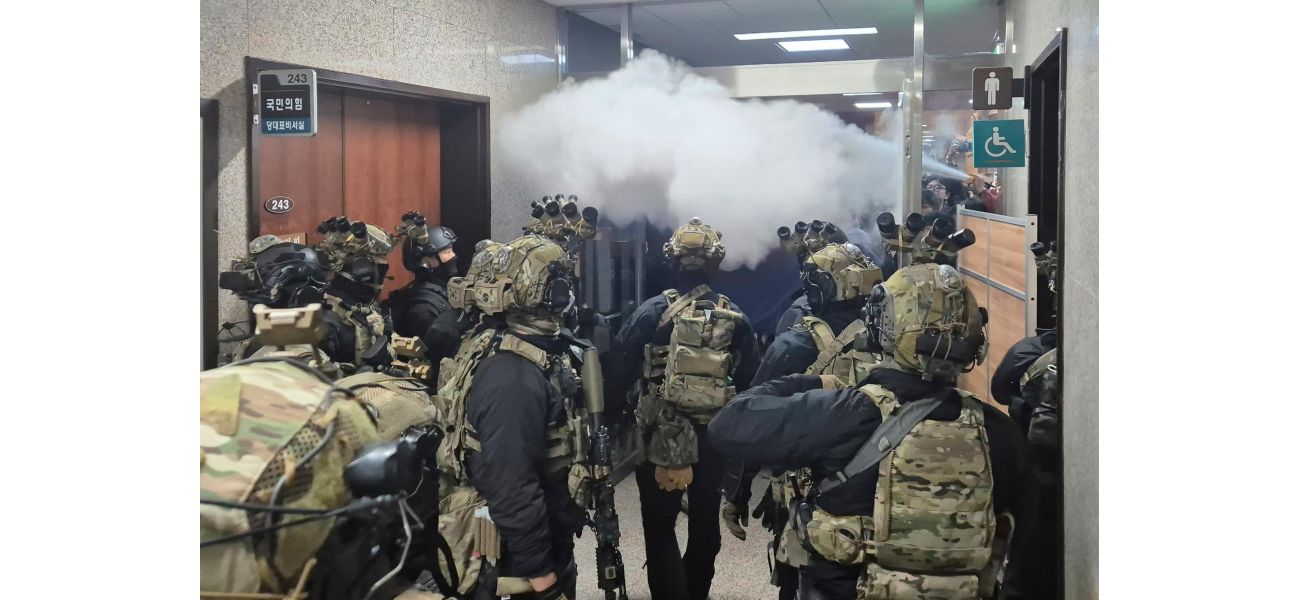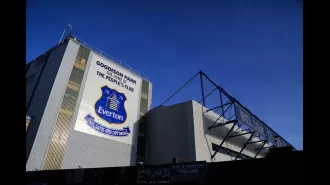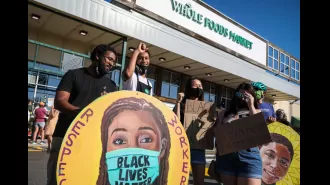Calls for South Korean President Yoon to step down or be impeached due to martial law.
South Korea's main opposition party is calling for President Yoon Suk Yeol to resign or face impeachment, after he lifted a brief martial law that surrounded parliament.
December 4th 2024.

On a sunny December morning in Seoul, South Korea, life seemed to be going on as usual. People were out and about, cars were honking, and construction could be heard in the distance. The only thing out of the ordinary were the crowds of police officers holding shields, a reminder of the events that had taken place the night before.
President Yoon Suk Yeol had declared martial law in an attempt to suppress what he called "anti-state" forces. However, his declaration was short-lived as the National Assembly, controlled by the opposition Democratic Party, voted to overrule him. The emergency martial law was lifted just six hours after it was declared.
The Democratic Party wasted no time in calling for President Yoon's resignation, citing his violation of the constitution. They even threatened to impeach him if he did not step down immediately. This would require the support of two-thirds of the parliament, a number they were close to achieving with their majority. Yoon's own party, the People Power Party, also showed dissent, with 18 members voting against his martial law declaration.
The leader of the People Power Party, Han Dong-hun, who was a close ally of Yoon, criticized his actions as unconstitutional. If Yoon were to be impeached, he would lose his powers until the Constitutional Court could rule on his fate. In the meantime, Prime Minister Han Duck-soo would take over his presidential responsibilities.
Many were shocked by Yoon's decision to declare martial law, as it was the first time such a measure had been taken in over 40 years. This reminded people of a time when South Korea was under military rule, and authorities used martial law to suppress any dissent. However, the scenes of military intervention on Tuesday night were a stark contrast to the democracy the country had become.
After Yoon's declaration, troops and police officers were deployed to the streets, equipped with full battle gear and assault rifles. They even pointed their weapons at peaceful protesters, who were demanding the lifting of martial law. It was a concerning sight, but fortunately, no major violence was reported.
The National Assembly Speaker, Woo Won Shik, praised the maturity of the military, as they peacefully left the grounds after the parliamentary vote. However, there were still many questions about how the lawmakers were able to enter the hall to vote down Yoon's martial law decree. Some managed to climb over the wall, while others were not aggressively restrained by the troops and police officers.
The events in South Korea did not go unnoticed by the international community. The White House expressed its concern, and the Pentagon confirmed that there was no impact on the U.S. service members stationed in the country. However, for tourists like Stephen Rowan from Australia, who was visiting the Gyeongbokgung Palace, life seemed to be going on as usual.
Yoon's decision to impose martial law was met with criticism and concern, even from experts who questioned the necessity of such a measure. It was seen as a serious backslide for democracy, and many were worried about the abuse of power under his administration. Natalia Slavney, a research analyst, stated that South Korea has a history of political pluralism and swift impeachments, as seen with former President Park Geun-hye.
In the end, Yoon's martial law was short-lived, and life in Seoul returned to normal. However, it was a reminder of the importance of upholding democracy and the rule of law, even in times of political tension.
President Yoon Suk Yeol had declared martial law in an attempt to suppress what he called "anti-state" forces. However, his declaration was short-lived as the National Assembly, controlled by the opposition Democratic Party, voted to overrule him. The emergency martial law was lifted just six hours after it was declared.
The Democratic Party wasted no time in calling for President Yoon's resignation, citing his violation of the constitution. They even threatened to impeach him if he did not step down immediately. This would require the support of two-thirds of the parliament, a number they were close to achieving with their majority. Yoon's own party, the People Power Party, also showed dissent, with 18 members voting against his martial law declaration.
The leader of the People Power Party, Han Dong-hun, who was a close ally of Yoon, criticized his actions as unconstitutional. If Yoon were to be impeached, he would lose his powers until the Constitutional Court could rule on his fate. In the meantime, Prime Minister Han Duck-soo would take over his presidential responsibilities.
Many were shocked by Yoon's decision to declare martial law, as it was the first time such a measure had been taken in over 40 years. This reminded people of a time when South Korea was under military rule, and authorities used martial law to suppress any dissent. However, the scenes of military intervention on Tuesday night were a stark contrast to the democracy the country had become.
After Yoon's declaration, troops and police officers were deployed to the streets, equipped with full battle gear and assault rifles. They even pointed their weapons at peaceful protesters, who were demanding the lifting of martial law. It was a concerning sight, but fortunately, no major violence was reported.
The National Assembly Speaker, Woo Won Shik, praised the maturity of the military, as they peacefully left the grounds after the parliamentary vote. However, there were still many questions about how the lawmakers were able to enter the hall to vote down Yoon's martial law decree. Some managed to climb over the wall, while others were not aggressively restrained by the troops and police officers.
The events in South Korea did not go unnoticed by the international community. The White House expressed its concern, and the Pentagon confirmed that there was no impact on the U.S. service members stationed in the country. However, for tourists like Stephen Rowan from Australia, who was visiting the Gyeongbokgung Palace, life seemed to be going on as usual.
Yoon's decision to impose martial law was met with criticism and concern, even from experts who questioned the necessity of such a measure. It was seen as a serious backslide for democracy, and many were worried about the abuse of power under his administration. Natalia Slavney, a research analyst, stated that South Korea has a history of political pluralism and swift impeachments, as seen with former President Park Geun-hye.
In the end, Yoon's martial law was short-lived, and life in Seoul returned to normal. However, it was a reminder of the importance of upholding democracy and the rule of law, even in times of political tension.
[This article has been trending online recently and has been generated with AI. Your feed is customized.]
[Generative AI is experimental.]
0
0
Submit Comment





